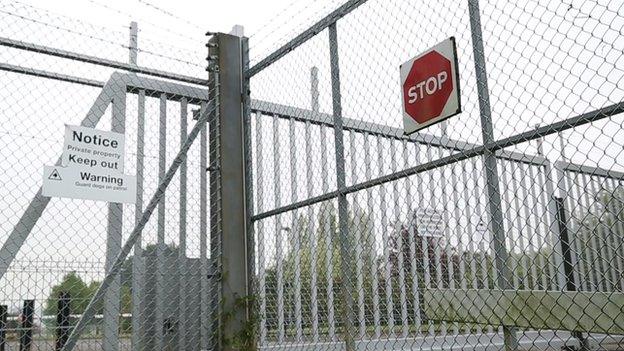Fast-track asylum appeal system planned by government
- Published

Colnbrook in Middlesex is one of the government's immigration removal centres
Plans to reintroduce time limits for the appeals of detained asylum seekers and foreign criminals against removal from the UK have been unveiled.
A previous fast-track system was quashed in 2015 because judges said the rules were unlawful.
New safeguards, including a case management review and strengthened powers for judges, would be introduced under the government proposals.
The independent Tribunal Procedure Committee will decide on the plans.
The rules would apply to detainees who had appealed against a Home Office decision to remove them from the country, including foreign offenders and failed asylum seekers.
Under the old system, fast-tracked cases in the First-tier Tribunal (Immigration and Asylum Chamber), external were subject to time limits, meaning they could be completed within 12 working days of an initial decision.
More time was allowed for appeals later lodged with the Upper Tribunal.
There has been no fast-track appeals procedure since.
Under the government's proposals, the time between an initial decision and conclusion of an appeal to the tribunal would be capped at between 25 and 28 working days.
'Better for detainees'
Justice Secretary Liz Truss said: "It is vital that foreign nationals who have no right to remain in the country should be removed as quickly as possible.
"We must ensure that foreign criminals and failed asylum seekers are not exploiting the justice system by attempting to stay in the UK after their claims have been rejected.
"Our proposals are also better for detainees as it will see their detention time cut."
The Home Office said the system could speed up about 2,000 cases a year and save the taxpayer an estimated £2.7m.
The Detained Fast Track (DFT) system was used to accelerate asylum cases that could be decided quickly.
But the Court of Appeal upheld a finding by the High Court that the rules were unlawful because of the speed of the process and a lack of sufficient safeguards for those making appeals.
The case was brought by campaign group Detention Action.


- Published2 July 2015
